


For our first game of Season Four, we had a typical mixed group of AI leaders duking it out for supremacy. Cyrus likes to focus on expansion and did an excellent job in past seasons of balancing land acqusition against peaceful development. Catherine is completely crazy, making demands of everyone and yet somehow winning more than her fair share of games in past years. Elizabeth is your standard peaceful AI, someone who loves to be left alone and would likely run away with the game economically if allowed to blanket the landscape with Financial cottages. She was the only Financial or Philosophical leader in this game. Isabella is a religious zealot, a fanatic who will love anyone who shares her faith and detest anyone who dares to practice something else. Qin Shi Huang and Roosevelt both love to construct wonders, and by pure coincidence, both of the game's Industrous leaders managed to roll marble resources at their starting positions. That could help them markedly, or it could result in both of them overbuilding wonders while losing out to their rivals. As usual, we had a fun group of contrasting styles between the different AI personalities.
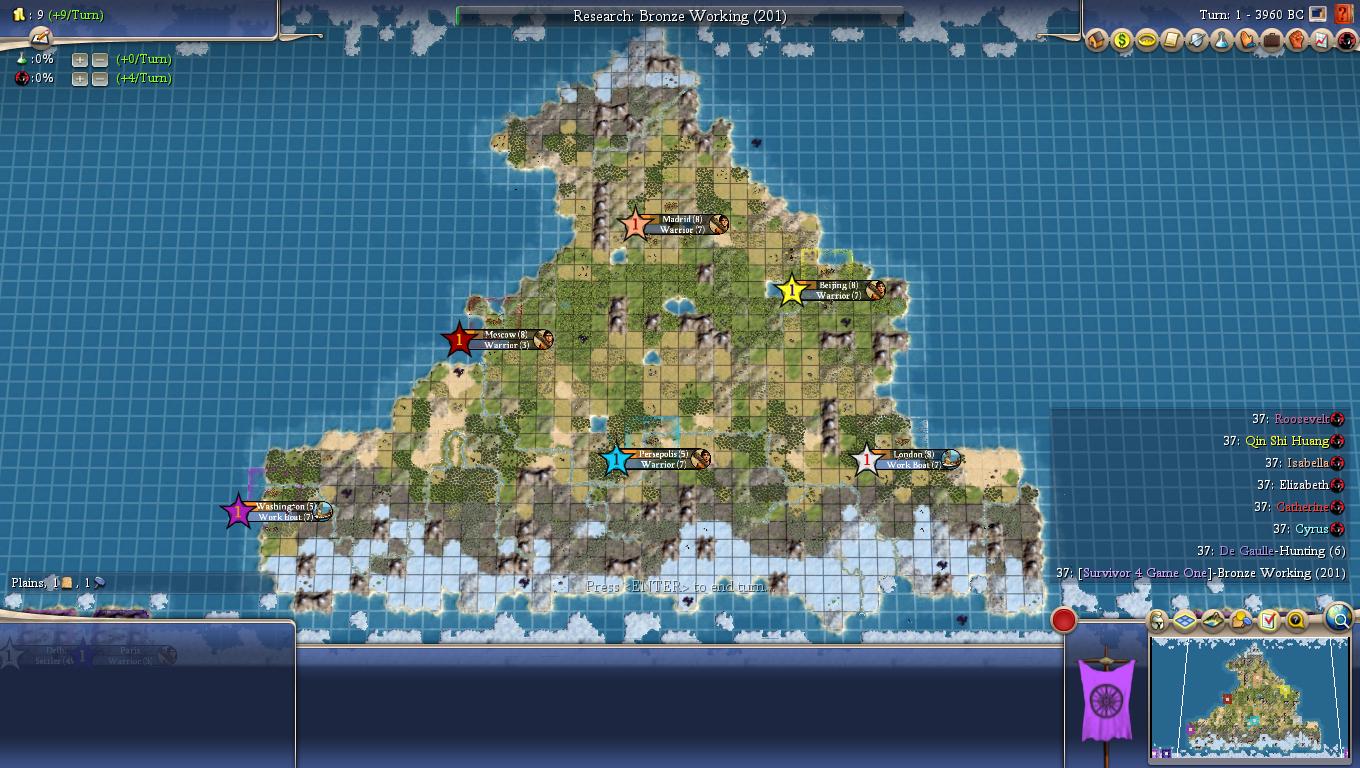
Cyrus and Catherine were the two seeded leaders drawn into this game, and they were the heavy favorites to win in the picking contest. We were watching them closely in the opening turns and both of them managed to get out to strong early starts. Cyrus put his Imperialistic trait to good use by being the first leader to reach three cities, while Cathy sent her free starting settler due south in a position where she cut off Roosevelt. The American leader would remain cramped on territory for a long time as a result of the Creative culture coming out of Russia. The most important early development took place in the religious side of the gameplay, and specifically where the initial religions would be founded. Isabella was the first one to Meditation tech as expected, and she founded Christianity in her second city of Barcelona. This city had been founded due south of Madrid, and the free Holy City culture was important in claiming territory for Spain in the disputed center of the map.
We thought that Isabella might sweep the early religions with her obsessive focus on faith-based techs, but that did not prove to be the case. Instead, Catherine founded the Polytheism religion and picked Taoism for her civ, giving us an immediate and hugely significant religious split. In the short term, the Holy City culture would further expand Russia's borders and cramp the amount of room left for America, made worse when Cathy built Stonehenge in the same city later. In the long run, this division between Christianity and Taoism would end up driving much of the diplomacy in the game. Isabella would develop her group of Christian co-religionists while Cathy would attempt to do the same thing with Taoism.
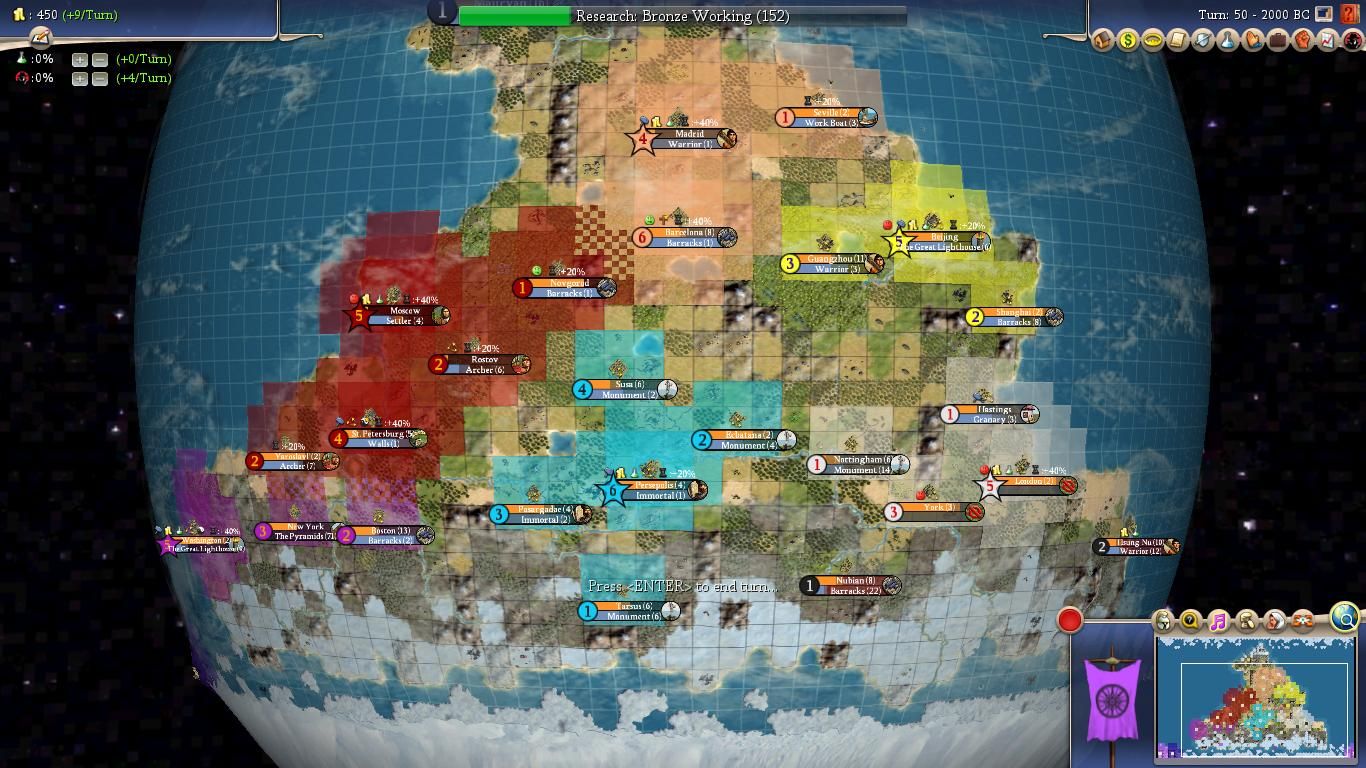
At the 50 turn mark the community favorites were leading the pack, with Catherine in first place in score and Cyrus in second place. The two Imperialistic leaders were doing a better job of expanding than anyone else, and that's typically the best path to success in these games. Elizabeth was also off to a solid start thanks to the fish resource at her capital, and she was one of the dark horses to win this contest. If she could take over the barbarian cities in the southern tundra, she could be in a position to match Cyrus or Catherine with better economic traits. At the other end of the spectrum, Isabella and Qin had been slow to expand in the north, leaving more territory open for the taking than should have been the case. Qin especially was wasting too much time on wonder builds, chasing after the Great Wall and then the Great Lighthouse while remaining on three cities. And then there was poor Roosevelt, who was already out of room to expand and had a third city that was on the verge of culturally flipping to Russia. In retrospect I should have done more with the map to make that corner location into a viable starting position. He didn't seem to have much of a chance.
We did not end up seeing any early wars in this game. The tech pace was slightly slower than in past years, as expected given the removal of the free Deity starting techs, and that may have caused the map to fill up with cities just a bit slower. As far as the wonders went, Catherine built the Pyramids while Isabella built the Oracle and slingshotted Monarchy tech, with both leaders adopting Hereditary Rule civic as a result. This was a major aid to both of them (the AI always struggles with happiness) and Isabella began to draw closer to the Cathy/Cyrus pairing in score. Meanwhile, Qin was making a fatal mistake:
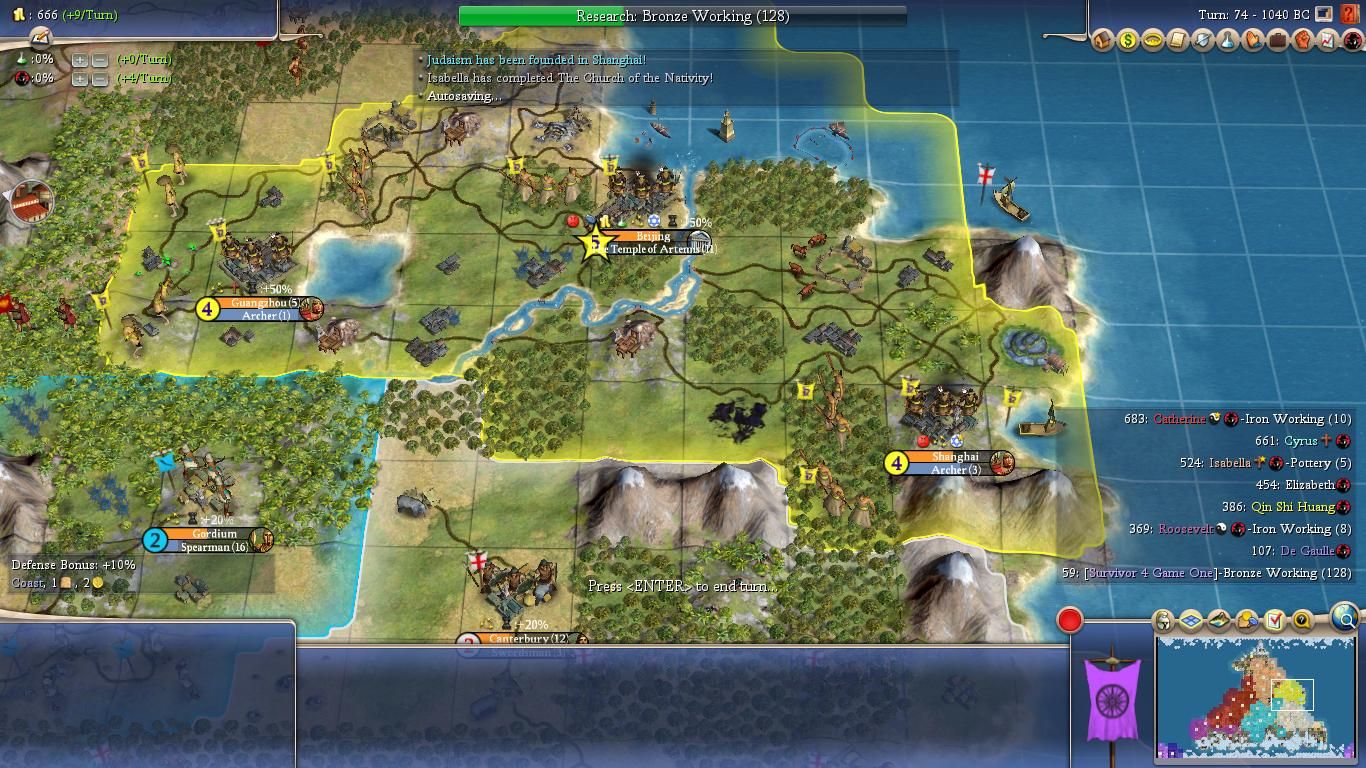
In a world where everyone else was either Christian or Taoist, Qin decided to research Monotheism and found his own religion in the form of Judaism. It was surprising how Monotheism hadn't been snapped up by another civ at an earlier date, remaining unclaimed for Qin to grab as late as Turn 74. Needless to say, this was a terrible decision from a diplomatic standpoint. It isolated Qin from everyone else in the world, and with exactly three cities to his name he was in no position to be going off on his own. The religious diplomacy was beginning to take shape by this point, with Isabella crucially spreading Christianity to Cyrus and Elizabeth. This would give her two solid allies on the eastern part of the map. Meanwhile, Cathy spread her own religion to Roosevelt and converted the Americans to Taoism. As a result, Cathy would ignore the easy pickings to her west and leave Roosevelt alone in this game. Critically, Catherine and Cyrus found themselves on the opposite sides of the game's major religious divide. A lot of the community had been anticipating them working together to crush the rest of the map, and that didn't seem to be in the cards in this game as a result.
We didn't see our first war of the game until Turn 94, and it was completely unexpected in terms of how it broke out: Elizabeth attacked Cyrus! What?!  One of the game's most peaceful leaders attacked a co-religious neighbor? That didn't make a lot of sense, and given that Cyrus was significantly stronger it seemed to signal a death sentence on the part of Elizabeth. This would turn into a gamelong rivalry between Persia and England despite the Christianity practiced on both sides. The next war popped up shortly thereafter, and this one was more predictable:
One of the game's most peaceful leaders attacked a co-religious neighbor? That didn't make a lot of sense, and given that Cyrus was significantly stronger it seemed to signal a death sentence on the part of Elizabeth. This would turn into a gamelong rivalry between Persia and England despite the Christianity practiced on both sides. The next war popped up shortly thereafter, and this one was more predictable:
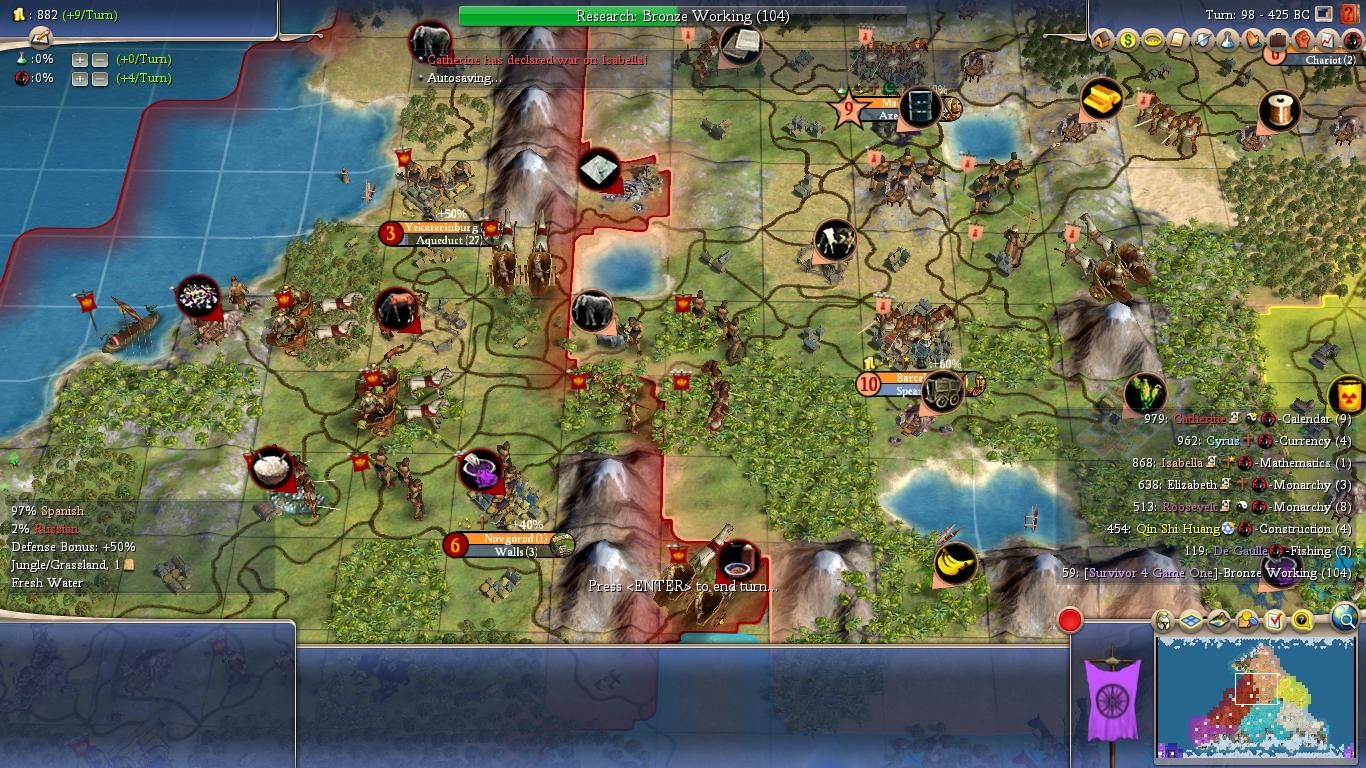
Catherine invading Isabella was highly predictable due to the religious diplomacy, although it clearly would have been smarter to go after the much weaker Americans to the west. In this era before the arrival of catapults, neither of these wars would see too much in the way of territory changing hands, although Cyrus did manage to take a border city away from Elizabeth. Things became more interesting when Roosevelt joined Isabella in her war against Cathy on Turn 100, putting the Russians into two-front war territory. The AI never handles this well and it was enough for Isabella to capture a border city away from Cathy. The Russians would recapture it a little bit later as well as capturing an American city that had been crushed by Russian culture, but the two sided conflict was still hurting Cathy nonetheless. We were left with a situation where Cyrus, Catherine, and Isabella were all very closely bunched together in score, with the lead trading hands back and forth. Eventually this series of wars came to a close with a series of peace treaties around Turn 115 without any major change in the big picture standings.
With the "Big Three" leaders all well out in front of the rest of the pack, their own interactions would largely shape how the next portion of the game would play out. Cyrus and Isabella were on good terms with one another due to their shared Christian faith, but Cathy's Taoism made her unpopular with both of them. We wondered which one of these three would trigger a war next, and sure enough it was Catherine, this time launching an invasion of Cyrus:

This was big news as nearly everyone in the picking contest had either Cathy or Cyrus as their leader to win the game, and whichever one of them could come out on top in this struggle looked to be in a position to dominate the game. It was a poorly timed invasion for Cyrus, who had been slowly gaining in his long running war against Elizabeth and now was faced with a dire threat on his opposite flank. One of the Persian border cities fell to Cathy and the struggle would continue to move deeper into the Persian core. There would be no further progress against England for the moment. Meanwhile, Isabella used this interval of peace to make an intelligent move by declaring war on the weak Chinese. Qin still only had three cities and was in no position to stop a Spanish invasion. He also controlled several juicy wonders, most notably the Mausoleum and the Great Lighthouse, which would be very nice for any attacker to capture. It took quite some time for Isabella to cut her way through the defending Protective longbows, but Qin was eliminated on Turn 163:
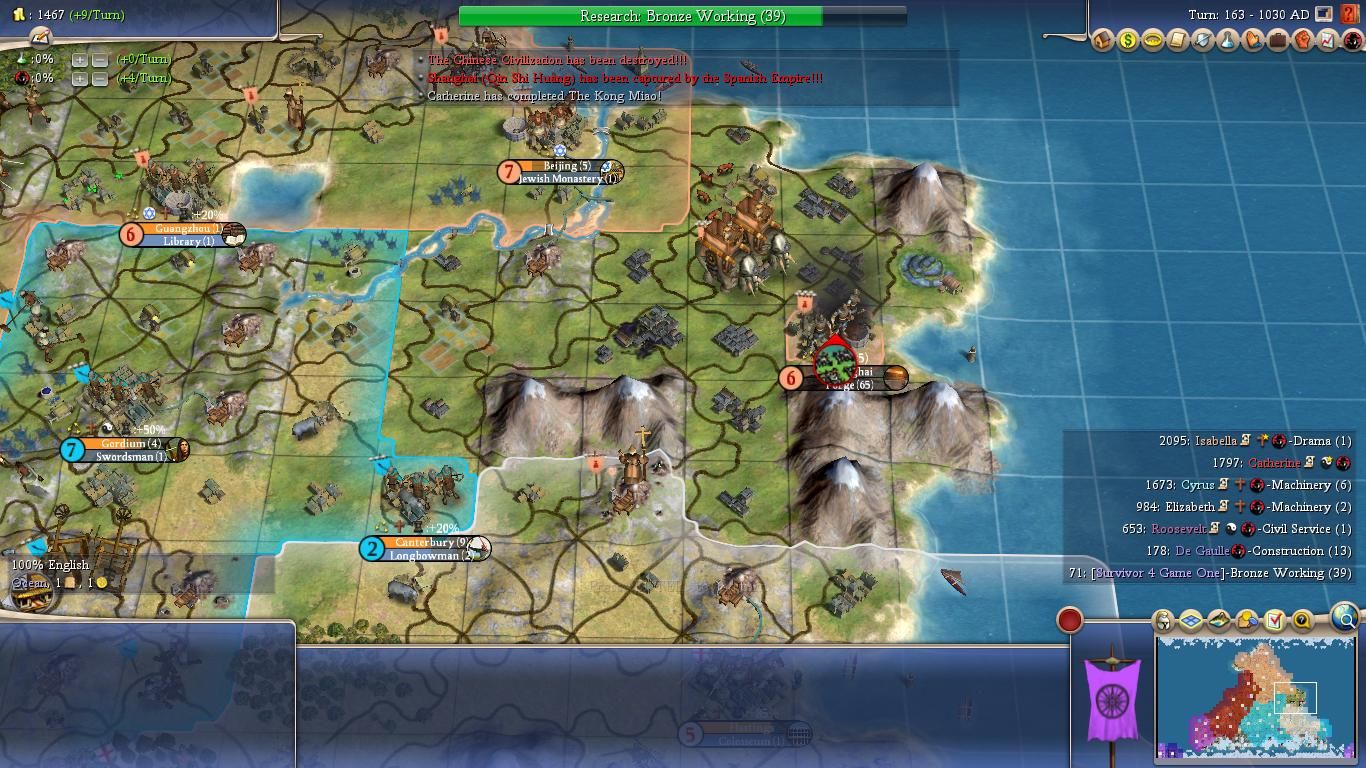
Qin had played a terrible game, never expanding beyond three cities for no apparent reason. He had been quite effective in past years of AI Survivor and I'm not sure why he fell on his face so badly in this game. (I did a test game on this map with different leaders to see if the second observer civ would work properly, and the leader in this starting position had been one of the most powerful during that experiment.) Isabella picked up several strong cities along with those powerful wonders while also getting about three dozen turns to work on infrastructure while her biggest rivals were caught up in warring. She took a small lead in the scoring as a result, with Cathy and Cyrus slightly behind Spain.
The previous round of wars between Cyrus and Catherine ended up being inconclusive. Cyrus first secured peace with Elizabeth and then concentrated on turning back the Russian invaders, with lots of units dying on both sides but no further cities changing hands. Eventually the two of them signed peace on Turn 143, only for Cathy to strike out yet again a little over a dozen turns later with a fresh invasion of Isabella. This wasn't enough to stop the Spanish destruction of Qin, and in fact it turned out to be a disastrous misplay when Cyrus joined Isabella against Cathy on the very next turn. Now Cathy found herself stuck in the two front war, up against the other great powers of the map. She truly had no one to blame but herself, as Cathy had attacked both Isabella and Cyrus previously, not to mention running her own unpopular religion for the whole game. Much of the community watched in horror as their champion in the picking contest was slowly carved apart, first losing some of her critical wonder-filled cities to Cyrus, and then eventually the rest of the Russian core. The pace of conquest was slow but inevitable, and neither Isabella nor Cyrus was willing to sign a peace treaty and give Catherine a reprieve. We knew it was over for Russia when the map looked like this. The final elimination took place on Turn 209, with Isabella claiming a second kill credit:

Which AI leader captures the last few cities during a joint war often comes down to pure luck. It turned out that Isabella ended up with significantly more of the spoils from Cathy's destruction than Cyrus largely due to this RNG luck as far as who would get the Russian cities. Cyrus took St. Petersburg and Boston, with the former city being hugely valuable due to a bunch of wonders and the presence of the Taoist Holy City. However, Isabella ended up claiming almost everything else, including all of the northern parts of the map and the cities on the American border. She had also built the Taj Mahal and launched another Great Person-based Golden Age, boosting both of them with the Mausoleum for the extended duration. This combined with the period of peace that Isabella had enjoyed earlier was enough to make her the clear tech leader, racing out to an edge of roughly 8-10 techs above Cyrus and Elizabeth. Cyrus had the land to be competitive at this point but not the economy.
Isabella was shockingly now the favorite to win the game, although we still needed to see if she could stick the landing and carry things out to a conclusion. There was a major diplomatic development in the aftermath of the Russian war: Cyrus had captured the Taoist Holy City, and therefore decided that he would convert over to Taoism himself. This had the effect of isolating Cyrus from Isabella, and set them up for future conflict down the road. In the meantime, Cyrus was looking to settle the score with Elizabeth and launched a new invasion in the east on Turn 222. He captured the English city on the border, and might have taken more if it hadn't been for an Apostolic Palace intervention:

Our plan to set up the second observer civ had worked as planned and we could see the Apostolic Palace resolutions like this one as a result. Cyrus had been stymied by Isabella's control of the AP voting as she intervened in the war to save a fellow Christian leader. That was too bad for Cyrus, as he desperately needed to conquer Elizabeth and take over her land to able to stand agaisnt Isabella's northern empire. For her part, Isabella was finishing the Statue of Liberty and running away with the game even further from an economic perspective. Perhaps Cyrus realized that he had a narrow window to fight while Persia and Spain were both using rifles but before Isabella reached infantry, and he therefore declared war on Isabella on Turn 245. This was a rash invasion that seemed to spell doom for Cyrus, especially when Elizabeth piled in on the Spanish side a few turns later. But things didn't play out as we expected: Cyrus signed a white peace with Isabella after the minimum ten turns of conflict, leaving Elizabeth stuck in a war by herself against Cyrus. Actually no, it was worse than that for the English, as Roosevelt was also at war with Elizabeth even if he was too weak to do much of anything.
Cyrus easily carved his way through the small English civilization, with one city after another falling. This was certainly the end for Elizabeth unless she could convince Isabella to intervene, and the Spanish seemed to be happy for the moment building their factories and coal plants and every Modern era wonder under the sun. When there were two cities remaining, Cyrus shockingly made peace with Elizabeth - why? It made no sense leaving a pair of English cities alive like that in the middle of Persian territory. But never fear, Roosevelt was still on the job! Yes, the American leader used his small stack of rifles and trebuchets to capture first Warwick, and then Newcastle to eliminate Elizabeth from the game:

Somehow, we ended up in a situation where Catherine had zero kills, and Cyrus had zero kills, but Isabella had two and Roosevelt had one. Go figure. 
The question at this point was not so much whether Isabella would win the game but rather how she would win it. In the screenshot above, she was researching Satellites while Cyrus was researching Military Science, and that pretty much tells the story. Spain was more than a full era ahead in tech, working on the spaceship while Persia and America were still in the early Industrial period. She could build her way to a spaceship victory with ease, or she could turn on the culture slider and win via three Legendary cities, or she could declare war on Cyrus and go for domination. The world was her oyster at this point. As it turned out, Isabella opted for the military route and declared war on Cyrus on Turn 297. Cyrus was still fielding an army of rifles and cavs while Isabella had infantry, artillery, bombers, and tanks. The results were about what one would expect:
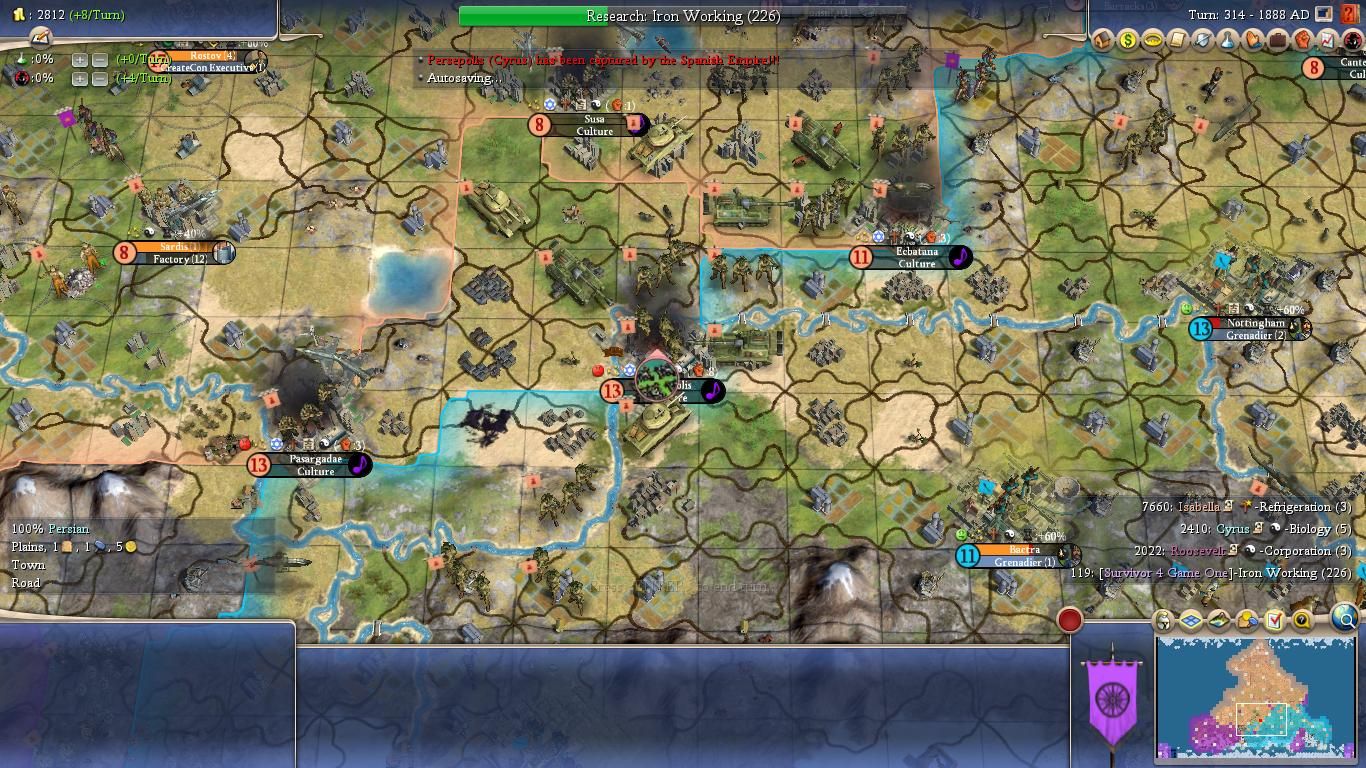
Cyrus put up a decent fight for the first dozen or so turns, but soon enough his reserve forces were decimated and he was left with only the new units that his cities were producing each turn, which was nowhere near enough. The technological edge was simply too great. We were watching a stack of about 80 Persian units as it moved around, and one turn it was simply gone, hit by a bunch of Spanish artillery units for collateral damage and then finished off with tanks and infantry. The Persian bar on the power graph nosedived and that was all she wrote. Unlike the slow invasions of earlier eras, the AI can capture territory very quickly in the lategame when it has a clear technological edge. Artillery units take out the city defenses with ease, and then tanks and paratroopers have no difficulty killing the defenders. You'll often see cities sitting empty with no defenders, the units inside killed by gunships (which can't capture cities), simply waiting for the tanks to arrive and finish things off.
Anyway, the Persian capital fell on Turn 314 and Cyrus was losing more than a city per turn by that point in time. His score had fallen below Roosevelt by now and the only remaining question was whether Isabella would hit the Domination limit before he could be finished off. As it turned out, Cyrus would not get a stay on his execution. He was eliminated on Turn 323 and Isabella won on the very next turn as a bunch of cities came out of resistance:
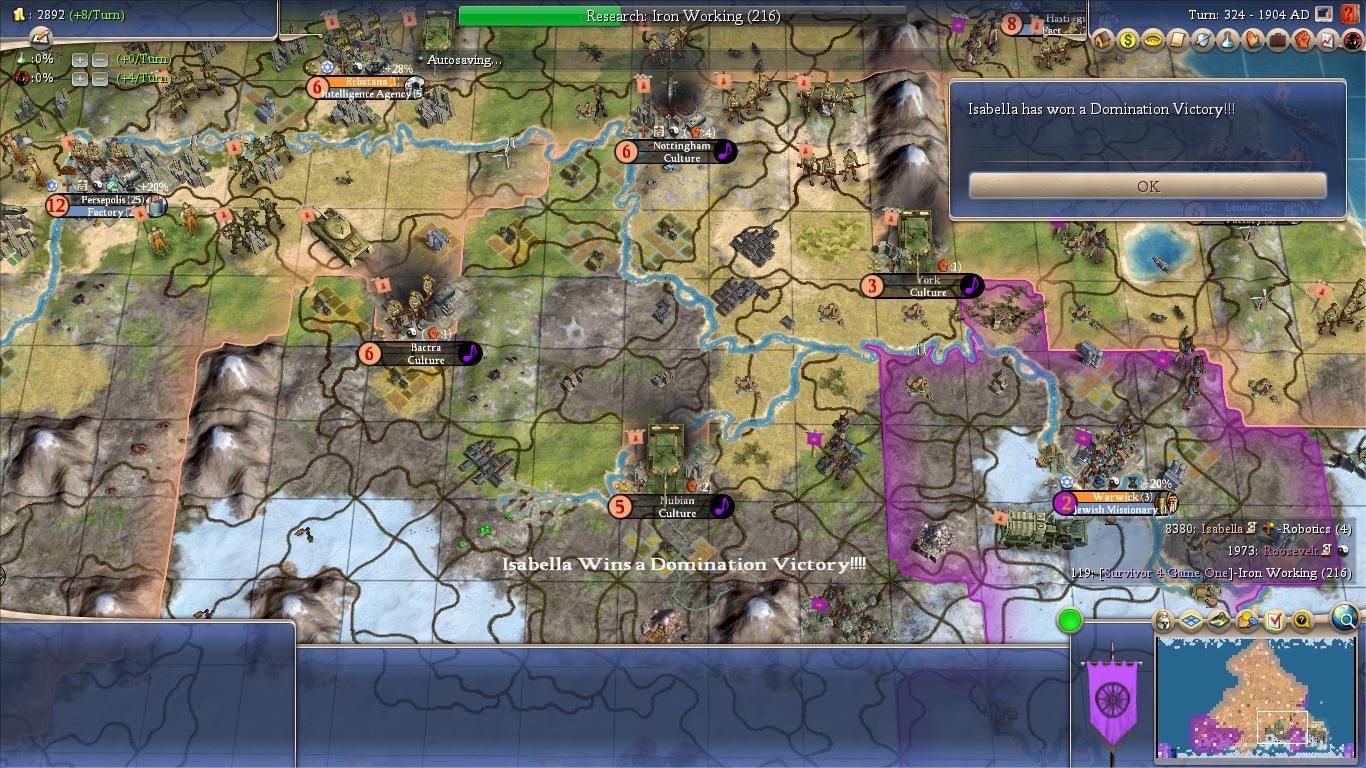
Isabella in a runaway first place result and Roosevelt in second place - not exactly what we were thinking before the game started!  There were several important keys to Isabella's unexpected victory in this game. For once, she managed to make use of religion without being obsessed with it. While Isabella did clean up all of the lategame religions, she only founded one of them in the early game and didn't waste her time chasing after endless religious techs at the expense of more useful developmental ones. Isabella spread Christianity around enough to reap major shrine income and build a durable coalition of diplomatic partners in the form of Cyrus and Elizabeth. This kept her safe from Catherine, as Isabella never found herself in a two front war, and also allowed her to expand into the far north uncontested. The conquest of Qin combined with Cathy's ill-fated invasion of Cyrus was the critical move that put Isabella into first place for good. Afterwards, she teamed with Cyrus to take down Catherine (reaping most of the rewards in the process), then later worked with Elizabeth to defeat Cyrus. It was a brilliantly played game from start to finish, aided of course with plenty of good luck along the way. If Cyrus and Catherine had worked together instead of fighting one another, Isabella would have had little chance.
There were several important keys to Isabella's unexpected victory in this game. For once, she managed to make use of religion without being obsessed with it. While Isabella did clean up all of the lategame religions, she only founded one of them in the early game and didn't waste her time chasing after endless religious techs at the expense of more useful developmental ones. Isabella spread Christianity around enough to reap major shrine income and build a durable coalition of diplomatic partners in the form of Cyrus and Elizabeth. This kept her safe from Catherine, as Isabella never found herself in a two front war, and also allowed her to expand into the far north uncontested. The conquest of Qin combined with Cathy's ill-fated invasion of Cyrus was the critical move that put Isabella into first place for good. Afterwards, she teamed with Cyrus to take down Catherine (reaping most of the rewards in the process), then later worked with Elizabeth to defeat Cyrus. It was a brilliantly played game from start to finish, aided of course with plenty of good luck along the way. If Cyrus and Catherine had worked together instead of fighting one another, Isabella would have had little chance.
A lot of people thought that Roosevelt's second place result was undeserving given how weak he was in this game, but Eauxps I. Fourgott provided an alternate opinion at Realms Beyond that I thought was worth including here:
Y'all can criticize Roosevelt all you want (they certainly were on-stream), but the fact is that he played just about as well as he could have this game. He had a terrible position - his starting position was quite cramped to begin with, then Cyrus and Cathy advanced towards him right out of the gate, Cathy using a Holy City to culturally pressure the only good land he could get to. There was no way he could've gotten much land, and so with his position he COULDN'T do much in the game.
But it wasn't for lack of trying that he accomplished little. He did his best to get some land from Cathy while she was tied up with Izzy, but he didn't have enough resources to pull it off. After that he picked on Lizzy, the other weakling of the bunch besides Qin, and was eventually able to get several more cities from that, all while staying on good terms with both Cyrus and Izzy. Frankly, if he'd done any more, he probably would've been taken out by one of the giants. Roosevelt didn't have an undeserving second place - he was doomed by circumstances, but managed to squeeze by anyway, and so I'd say it was a well-deserved advancement for him. If you want somebody who didn't play well, look at basically everybody else except for Isabella, who played a truly masterful game from start to finish.
Well said indeed. There's a fine art to playing your way out of a weak starting position and working around more powerful neighbors, and Roosevelt excelled at it in this game. He was lucky to be sure (his invasion of Catherine on Turn 100 would have been a total disaster and resulted in his own conquest if Russia hadn't launched a war against Spain four turns earlier) but deserved the benefit of the doubt in this game. Anyway, it was quite the opening game. We'll see Isabella and Roosevelt again in the playoffs, and find out if they can continue the winning ways on display here or fall back into the mediocrity of previous seasons.
* * * * * * * * * * *
Over a year after Season Four concluded, Wyatan decided to rerun the Season 4 games, 20 times each, and publish the results. The objective was twofold:
- See how random the prediction game actually is. There's a natural tendency when your predictions come true to go "See! Told you!", and on the contrary to dismiss the result as a mere fluke when things don't go the way you expected them to (pleading guilty there, Your Honour). Hopefully, with 20 iterations, we'll get a sense of how flukey the actual result was, and of how actually predictable each game was.
- Get a more accurate idea of each leader's performance. Over 5 seasons, we'll have a 60+ games sample. That might seem a lot, but it's actually a very small sample, with each leader appearing 5-10 times only. With this much larger sample, we'll be able able to better gauge each leader's performance, in the specific context of each game. So if an AI is given a dud start, or really tough neighbours, it won't perform well. Which will only be an indication about the balance of that map, and not really about that AI's general performance. But conversely, by running the game 20 times, we'll get dumb luck out of the equation.
These were the results of Wyatan's investigation of Game One from Season Four. Game One was a pretty open game, with four of the six AIs having a decent shot at winning.
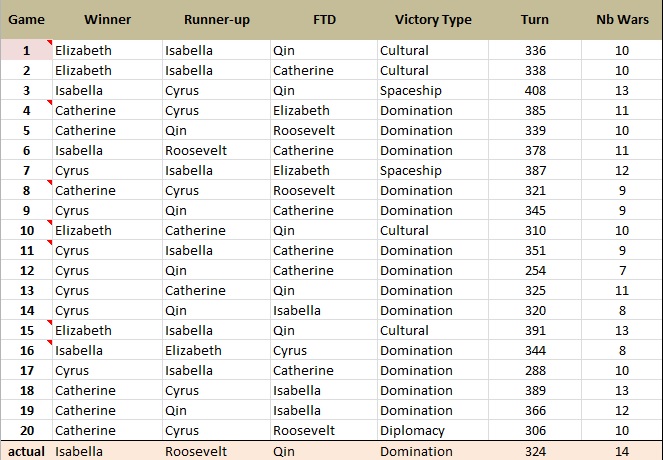
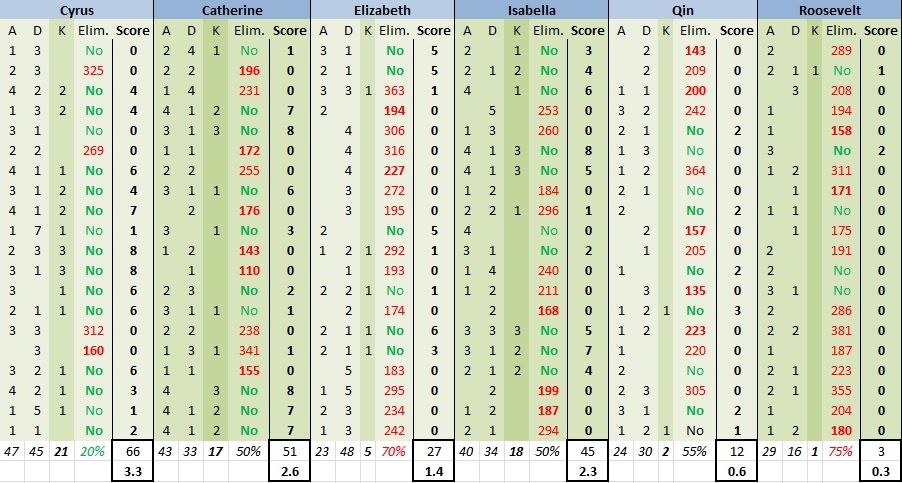
(note : "A" column tracks the number of war declarations initiated by the AI, "D" the number of times the AI is declared upon, "K" the number of kills)

Cyrus was the top contender there : he has the best survival rate and the best win rate, with some very impressive and fast wins. So you got unlucky there, Sullla : you definitely made the right call for favourite to win. That said, with a 35% win rate only, Cyrus wasn't exactly an overwhelming favourite either.
Catherine was more of mixed bag : second best chance to win (right on Cyrus's heels), but also most likely to be first to die. This seems pretty easy to explain, though : her position favoured early clashes with Cyrus and Isabella, the two strongest AIs on this map. That was a recipe for disaster (hence her frequent early eliminations), but when she pulled through, that set her up for the win : if you beat the top dogs, that usually makes you the new top dog.
Isabella was also a strong performer here, though not as strong as her win in the competition game might suggest. She had lots of room to expand, and would often expand further through conquering Cathy (often getting help from Cyrus and/or Roosevelt in that conflict). While geography explains in good part her successes (northern backline), it was also the root of her downfalls : she wasn't connected to the extensive river network in the south. Meaning that any religion founded in the central/southern part of the map (by Cyrus in particular) would spread like wildfire, while her own Christianity would remain in Spain (sometimes spreading to China, but that's it). It could be a case where removing the Apostolic Palace changed things significantly in my tests : a low foreign spread would give her total control of the AP, allowing her to abuse it at will. So the fact she still maintained a high performance level without the AP in play shows how strong her position was in that game.
Elizabeth was a "high contrast" performer there : she either won the game, or she got killed (in the only two instances where she survived without winning, she was on her way out in the first case, with less than 10 turns to live, and in the second case, she only lived because Isabella chose to murder Catherine whom she was friendly with, rather than her she was annoyed with). Bad leader for the prediction contest then : not enough of a favourite to consider backing her, especially since the "reverse order" points are not in play, but with enough of a win rate to mess you up. Cyrus was a major threat to her, while Qin provided a conquest option. Isabella was a issue: the Spanish zealot tended to found and bury a lot of the late religions, thus keeping them out of English lands. The lack of religious diversity would critically slow a lot of her attempts at a cultural victory.
Roosevelt and Qin were the complete duds in this match. The only surprise being they wouldn't stand higher in the first to die category. I think this is explained by the fact that early conflicts were most likely to break out between the major players first, Roosevelt and Qin being eliminated later, as an afterthought. Now, don't read too much into that as to those leaders' general performance : their starting positions were just awful. Roosevelt had extremely low quality land, no back line, and was next to Cathy : creative + imperialist ! Qin had much better land... but no backline either, and was tightly squeezed between three other leaders.



